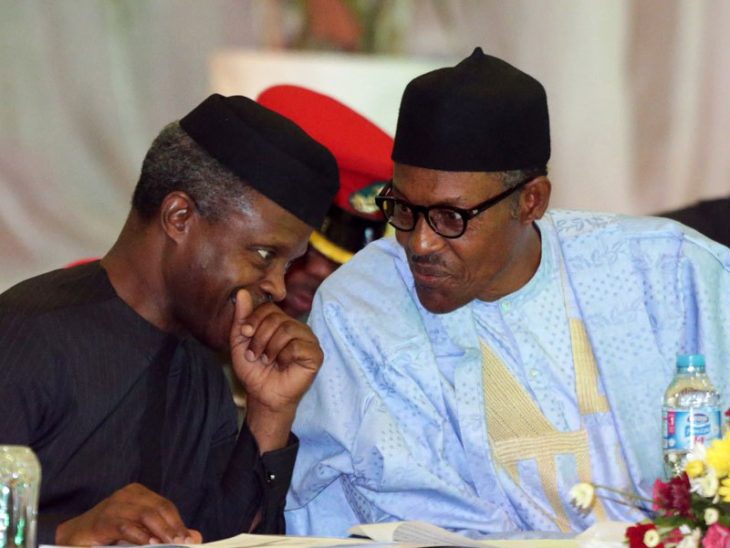Not too many Nigerians expected the nation’s Covid-induced recession which hit the economy in the Third Quarter (Q3) to have disappeared in Q4 with an expansion of 0.11 percent. For one, I watched many economic experts discuss the “unexpected exit” of Nigeria from recession when there’s nearly no end in sight to the United Kingdom economy exiting recession.
As economist Bismark Rewane said in an interview with Channels TV this morning, this remarkable development can be attributed to four interrelated factors which include the fact that the Economic Sustainability Plan (ESP) “was more successful than we thought it would be initially”.
President Muhammadu Buhari asked the Vice President, Prof. Yemi Osinbajo to head the Economic Sustainability Committee (ESC) to come up with a blueprint for post-Covid economic recovery. In June 2020, the Osinbajo-led ESC submitted its report with the Buhari-led Federal Executive Council approving it as the Economic Sustainability Plan (ESP). The N2trillion ESP is now being implemented by the Federal Government today. The ESP includes several packages like MSME Survival Fund, Youth Fund, Mass Housing Programmes, massive Agric plan, Solar installations, and the likes.
So for instance, the recently launched Solar Power Strategy which focused on creating about 250,000 jobs is enabling about 5 millions solar homes systems to be installed across the country. Under the Plan, the Central Bank of Nigeria (CBN) will provide structured loans to manufacture these Solar Home systems and many of them are assembled locally in order to promote business in the nation. Also, the Mass Housing Programme expected to created 1,500,000 jobs.
An essential part of ESP are the Micro and Small, Medium Enterprises (MSMEs). It will be recalled that Osinbajo as Acting President signed the Presidential Executive Order on Ease of Doing Business on May 18, 2016. This Order was aimed at improving businesses and attracting foreign direct investments (FDI) to Nigeria. This Order made it easy for Nigerians to register their businesses with the Corporate Affairs Commission (CAC). As a result of the Presidential Order, Nigeria moved up more than ten steps on the World Bank Ease of Doing Business Index since 2017.
To demonstrate the government’s commitments to supporting MSMEs, an entire aspect of the ESP called Survival Fund Payroll Support Scheme has been dedicated to payment of their staff salaries for a minimum of three months (in the initial instance). As I write about 300,000 MSMEs in over 30 states of the Federation have benefitted from this. The positive impact this has had on the Nigerian business environment is incalculable especially as these businesses were still battling with the negative effects of Covid. It’s in the understanding of the Osinbajo-led Economic Sustainability Committee that injection at such a crucial time goes a long way to boost investor confidence in the economy. Another happy thing about this crucial scheme is that the Government has kick started Batch 2 in February 2021 which targets over 200,000 beneficiaries with about 45 percent of them being women and youth owned businesses.
As a follow up to the Executive Order on Ease of Doing Business, the Federal Government set up the Osinbajo-led Presidential Enabling Business Environment Council (PEBEC) with the aim of minimizing the constraints that come with running businesses in the country in 2016.
The Council, since inception, has been able to put together reforms geared toward making it more convenient for business owners to thrive. No one should, therefore, be surprised that Nigeria has consistently moved up in the World Bank’s Ease of Doing Business Index in the last few years. Also, to cope with the challenges of Infrastructural deficit, the Federal Government appointed Osinbajo to head the recently formed Infrastructure Company of Nigeria.
If there’s anything we all must agree with, it has to be that the Federal Government’s decision to stick with the timelines of implementation of the report of Osinbajo-led Economic Sustainability Committee (ESC) set up by President Buhari in April 2020. I agree with Rewane’s view on CHANNELS about the positive impacts of ESP in the past few months. I must also commend Buhari for entrusting Osinbajo with this all – important assignment.
Professor Osinbajo was certainly intentional about ensuring all went according to schedule to come up with the ESP. He personally followed up on Ministries and parastatals in ensuring all hands were on deck in implementing the Plan which are no easy tasks. As noted by Laolu Akande, Osinbajo’s spokesman, his passion for the poor has led him to initiate about the largest social investment programmes in Africa today.
Whilst the implementation is still on, the ESP has done significantly well in the areas of job and wealth creation just in the space of few months. The ESP, we must know, is not a collection of theoretical principles or fancy statements or beautifully worded document which is tailor-made not to work. Sound economics is about seeking solutions that works or will work to lift the lives of the farmers, rural poor, MSME, youth, women and the vulnerable who constitute the critical mass of the economy.
That the nation got out of economic downturn when advanced economies like the United Kingdom are still neck-deep into recession testify to the meticulous economic management of the current administration. The fact that the Nigerian economy achieved this at such a high speed only reflects the hardwork, resilience, stamp and competence of Professor Osinbajo on the wheel. Honestly, Osinbajo deserves to be commended for Nigeria’s recession exit.
We must never overlook such huge and remarkable effort that made Nigeria avert a deep recession. While a number of us are known for speaking up against bad governance, we must also speak up when the right steps are taking towards a better Nigeria
Olalekan Adigun, a public affairs analyst, writes from Lagos.

 Join Daily Trust WhatsApp Community For Quick Access To News and Happenings Around You.
Join Daily Trust WhatsApp Community For Quick Access To News and Happenings Around You.


